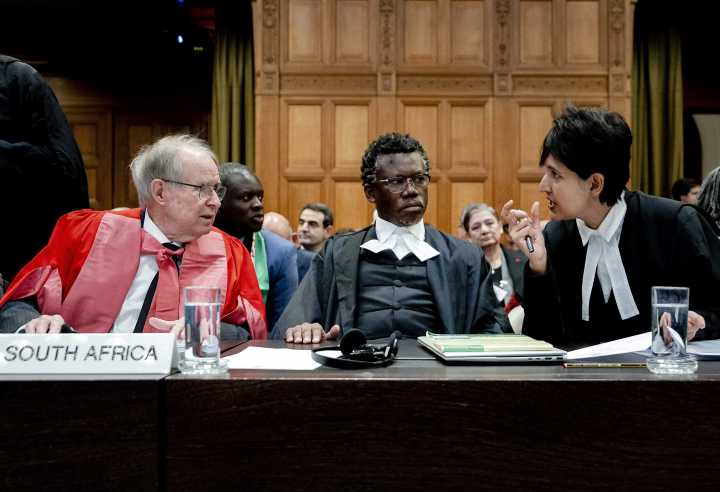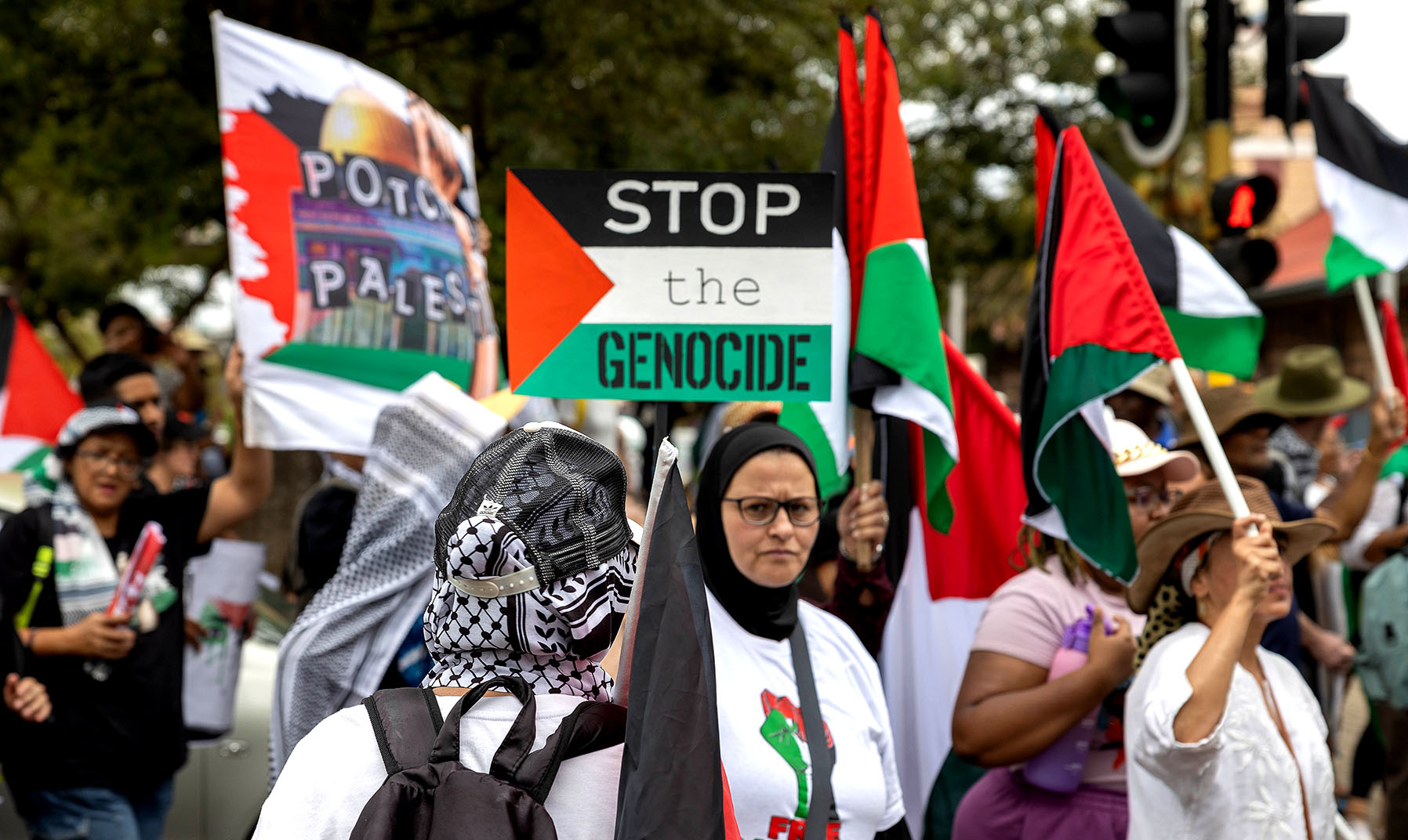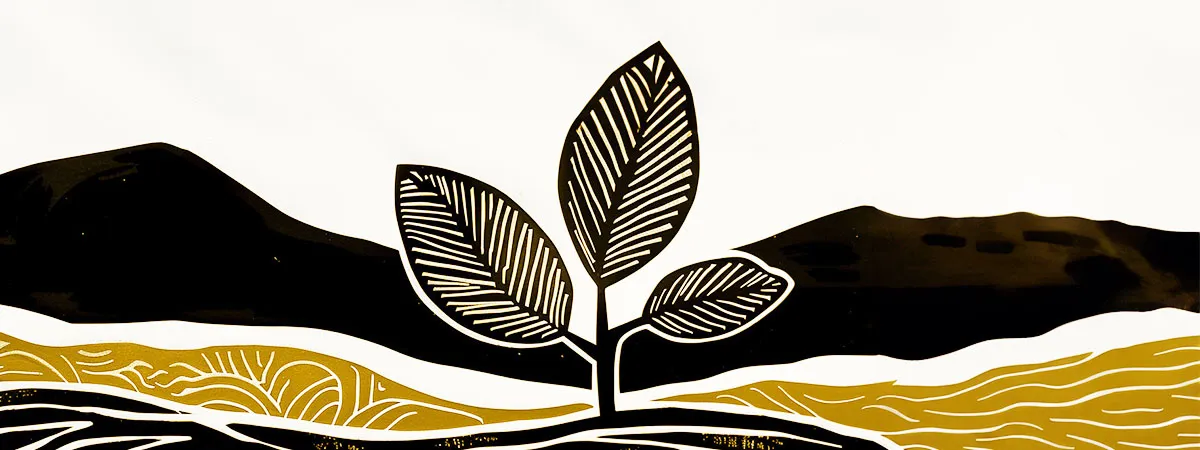THE CONVERSATION OP-ED
Genocide case against Israel is South Africa’s proudest foreign policy moment in three decades

South Africa's consistent support for the Palestinian struggle remains a shining example of solidarity and a return to the founding principles of the post-apartheid era.
On 11 January 2024, South Africa hauled Israel before the International Court of Justice (ICJ) on the charge of violating the 1948 Genocide Convention. This was for Israel’s indiscriminate bombing and siege of Gaza following the deadly 7 October attack on Israel by Hamas which claimed 1,200 Israeli lives.
More than 25,000 Palestinians, at least half of them children, have reportedly been killed in Israeli retaliatory attacks. The siege has led to a humanitarian crisis, as civilians struggle to get food and have no access to hospitals, which have been all but totally destroyed.
The South African team of lawyers pleaded with the court to impose provisional measures — temporary orders to stop irreparable harm, including an immediate ceasefire — while the court considers the merits of the case.
Read more in Daily Maverick: How South Africa seeks an order to stop the carnage in Gaza and prevent a genocide
As observers of South Africa’s international relations, we believe this move to be the high-water mark in the country’s foreign policy since the end of apartheid in 1994.
South Africa’s liberation is sometimes portrayed as the last act of 20th century decolonisation: the crowning moment of “Third World” solidarity. The country’s new approach to foreign policy symbolised the hopes of countries that struggled for freedom. The (now governing) ANC’s discussion document of 1994 stated: a democratic South Africa will be in solidarity with all those whose struggle continues.
From Mandela to Ramaphosa
Nelson Mandela, the first president of democratic South Africa, advocated for human rights, sometimes even at the expense of African partners. That early promise was progressively whittled down.
In 1995, for example, Mandela pleaded with then Nigerian military head of state Sani Abacha to spare the lives of Ken Saro-Wiwa and eight other Ogoni activists. Critics of the Nigerian government’s failure to act against foreign oil companies causing environmental damage, they were accused of murdering Ogoni chiefs. Mandela’s pleas fell on deaf ears and they were executed.
In his scathing response, Mandela called for Nigeria to be expelled from the Non-Aligned Movement and the Commonwealth until it established democratic rule. South Africa also recalled its High Commissioner to Lagos for consultations.
From the late 1990s, under the succeeding presidencies of Thabo Mbeki, Jacob Zuma and Cyril Ramaphosa, the South African government has often supported authoritarian regimes in the global south, often in repudiation of people’s struggles. Examples are China, Russia, Sudan and Zimbabwe.
South African foreign policy is often described as being inconsistent, unclear and insincere.
Palestine remains the single issue on which South Africa’s support for a people’s struggle has been unquestionably consistent.
Solidarity with Palestine
During the Cold War, the apartheid South African and Israeli states collaborated on military, diplomatic and nuclear issues. The liberation movements of these two countries — namely the Palestinian Liberation Organisation (PLO) and the African National Congress (ANC) — practised an alternative form of internationalism. This was subversive and inspired by people’s solidarity in the Third World.
In 1974, when the PLO leader Yasser Arafat addressed the United Nations General Assembly, the first liberation leader to do so, he called for the same right to be extended to other liberation movements. Arafat used the occasion to denounce the apartheid regime with the same vehemence as he used to criticise Israel.
Two years later, the then ANC president, Oliver Tambo, stood before the same body and both applauded Arafat’s leadership on this matter and expressed “unswerving solidarity” with the Palestinians.

International day of solidarity march from Mary Fitzgerald Square to Nelson Mandela Bridge on November 29, 2023 in Johannesburg, South Africa. (Photo: Gallo Images / Papi Morake)
In addition to diplomatic support, the two movements shared resistance tactics.
Arafat’s own faction within the PLO, Fatah, assisted the ANC and other resistance movements to acquire training and arms. Importantly, the relations between Tambo and Arafat were based on trust. In 1988, Tambo asked Arafat to help with securing funding from the Middle Eastern countries and requested the PLO to become a financial trustee of funds from that region.
The lodestar
This consistency of approach and support was reflected in South Africa’s case before the ICJ. It has put the promise of liberation back into South Africa’s national consciousness. This imaginative initiative reveals a sense of clarity that the country’s foreign policy has lacked due to its inconsistencies which resulted in contradictory choices in the 21st century.
It stays true to the founding principles of the post-apartheid polity. Not only was this needed in the country’s approach to international affairs, but it is vitally important to restore its self-image.
South Africa’s team at The Hague included opponents of the ANC government. As they argued the legal and ethical case against Israel’s genocidal ambitions, their country watched in hope.
Could its international relations finally live up to the high ideals the country set for itself when apartheid ended?
South Africa’s appearance before the ICJ is an affirmation of the moral compass that the ANC government has lost. DM
This article was first published in The Conversation.
Peter Vale is Senior Research Fellow at the Centre for the Advancement of Scholarship, University of Pretoria. Vineet Thakur is Assistant Professor of International Relations at Leiden University.
Disclosure statement: The authors do not work for, consult, own shares in or receive funding from any company or organisation that would benefit from this article, and have disclosed no relevant affiliations beyond their academic appointment.
Read another perspective here: South Africa’s divisive ICJ case against Israel has already altered its foreign policy space.




Good laugh, thank you
Laughter is the best medicine they say – thanks for the chuckle. I seem to recall Peter Vale having a shred of integrity somewhere in the distant eighties?
In other words, since Mandela, the only foreign affairs moment to be proud of. The bar was not very high to start with.
If our foreign policy becomes more consistent and applies similar principles to Russia, China, Sudan etc. then we can truly say that we can be proud of that policy. One swallow does not a Spring make.
Are the authors serious?? It’s so obvious that the ANC has aligned themselves with anti-western forces, no matter what. The body count in Sudan and Ukraine is far, far bigger than Palestine. The current case has nothing to do with the ANC’s moral compass but everything with siding with whoever is giving the West the middle finger. The war in Ukraine is ongoing – surely if there was a moral compass they’d have spoken up by now. I do hope however that some good will come from this case.
You forgot the body count and misery in Syria, and the Uyghur re-education camps in China.
And the body count in SA!!!
Really, only three questions.
1. On how many occasions has Israel threatened any state or ethnic entity with annihilation?
2. For what periods of its entire existence since the UN granted it sovereignty has Israel NOT been under threat of annihilation by one or more Muslim states or quasi states? (E.g. PLO, Hamas, ISIS)
3. Do the answers to these two questions above lead to any conclusions regarding allegations of genocide?
Well put, but the ANC/SACP has other, more pressing, concerns – lack of global relevance and a fiscally pressing need to be seen to be doing the “right thing”.
The ANC’s case against Israel is hardly “South Africa’s proudest moment”. It is , rather, a clear picture of the depths of amorality and ignorance to which the ANC has sunk.
Yeah, right up there with SA’s refusal to arrest Sudan’s Al-Bashir, and its proud support for Mugbarbage, with his Operation Murambatsvina (“drive out the rubbish”, in which the “rubbish” refers to poor Zimbabweans.)
What a paragon of morality and integrity the ANC regime is. We’re not worthy of being ruled by these shining beacons, and it’s a true honour to be (mis)ruled by them. Far be it from me that the mullahs in Iran funded this grotesque spectacle of oleaginous hypocrisy.
(But seriously, I hope Vale and Thakur have enough soap at home to remove the brown fecal rings from their necks, after this jewel of pathetic and obsequious groveling before the grotesquely hypocritical ANC regime.)
Please ignore my previous post as it was incomplete.
You must be joking. The whole initiative was a complete shambles. In the absence of any evidence of “genocide” (and, in fact, there being plenty of evidence to the contrary) the South Africans mumbled about “intent” of genocide. If the Israeli government had intended to commit genocide they could have flattened Gaza in a few days. I agree that the IDF response has been heavy-handed but no-one has produced a better idea for removing Hamas. A unilateral ceasefire by the IDF plays directly into the hands of Hamas. The South African government (another joke) is simply doing Hamas’s job for it. Hamas is a terrorist organization that is a product of a massive failure by the Palestinian authorities to run their territories properly. As with so many other recent ANC initiatives, this case is just an electioneering stunt, at the South African taxpayers’ expense and against the interests of people living in this country.
I’ve never thought of that – but it is probably the best argument: If Israel had wanted to commit (in other words had the ‘intent “) genocide, they could have annihilated the whole of Palestine in a few days… why would they go on this time consuming footsoldier offensive???
No… there was no intent to commit genocide.
Well stated.
At long last we have two authors who layout the circumstances of South Africa’s application to the ICJ. What is clear is that South Africa was morally, diplomatically and legally right to cite Israel before the bar of International Justice. For far too long Israel has been able to do what it wants, when it wants and how it wants with Gaza and the West Bank.
The present Israeli Cabinet wants to conduct a destructive political and economic campaign against the people of Gaza and the West bank in defiance of international law. In essence they want to drive out the citizens of Gaza and the West Bank so they engage in a brazen anschluss of these two territories. This must never been allowed to happen. South Africa has hopefully begun the process to prevent such an anschluss.
Even if I were to agree with you, a significant contention is that this court action cannot be ascribed to morality, principled diplomacy or championing international law, but rather to alignment. There are several current wars and pogroms as bad (or perhaps even worse) than what’s happing in Gaza to which the ANC acts blind, deaf, and mute in respect to the atrocities committed.
They have missed the point entirely. Consistency is vital and the ANC has its enemies, Israel and the West, and its friends, Russia, Iran, Warlords and tyrants etc
Iran has a lot of useful idiots on both sides to feed there propaganda war
Given South Africa’s shameful history of backing autocrats and murders, that is the faintest of praise. To believe this is not about the ANC advancing its own electoral prospects is gullible indeed.
Yes and it all came about after a visit to Iran and a visit from Hamas. Get real. Where were they when Mugabe annihilated 1000s of Matabele, etc, etc, etc.
Where did the authors get their figures from ? I would hope from the Israelis themselves.
But I doubt this.
Shining example???
Amongst a plethora of mistakes this government is making, one stands out above the rest: The fact that having had credentials once as social activists allows them to think they can govern or have any morality.
This palestine charade is them going back to their best: loudmouths without any backbone.
What a load of horses. Unbelievable hypocrisy
What rubbish. There is no moral compass.
I don’t think ‘proudest foreign policy moment’ reflects South Africa as a whole, and one instinctively responds with ‘not in my name’. SA in recent years, and accelerated under Pandor, appears to have no meaningful foreign affairs policy to speak of. It simply has countries that it likes, and those that it doesn’t. To talk of its position and response to the Israel-Hamas matter as a ‘human rights-led’ initiative is impossible to reconcile with its cosy relations with Iran, its tone deaf dealings with Sudan, and its blundering around in the dark with Russia, pretty much completely ignoring Ukraine. All the while taking every opportunity to antagonise the US and other European countries that have historical and economic ties with SA, and that have been for the longest time supporters of SA. It’s not too much of a stretch to describe our position under Pandor and Ramaphosa as an embarrassment. All this talk of the support SA has received over the ICJ matter are from inconsequential countries and organisations. Yet it’s all so exciting for the pundits as it reflects SA ‘standing up’ to the ‘West’, which seems like a really really stupid idea and one that is surely not universally supported. Today’s ICJ ruling will be spun as a victory for SA almost regardless of the outcome, but the bill will come due in due course as our much vaunted ‘non alignment’ crystallises into being very very much aligned, just not with counties aligned to our economic interests.
I wish government will have the same vigour to get all the problems South Africa face in order. How many lives or livelihoods have been lost due to poor service delivery and corruption?
Proud, proud moment for SA!
Complete and total joke – undertaken with funding from Iran, and as a distraction to the utter failure that is the SA government. Pick better friends, SA.
South Africa seems to be one of the few countries that have not forgotten their struggle and have learned from the past. Germany clearly hasn’t learned a thing.